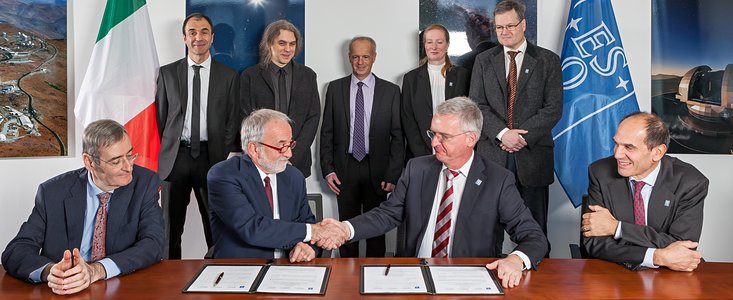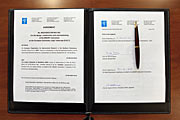Anuncio
Firman acuerdo para construcción del sistema de óptica adaptativa MAORY del E-ELT
10 de Diciembre de 2015
ESO y un consorcio internacional [1] han firmado un acuerdo para el diseño y construcción del sistema de óptica adaptativa MAORY, el que será operado en el European Extremely Large Telescope (E-ELT).
El convenio fue firmado por Nicolò D'Amico, Presidente del Istituto Nazionale di Astrofisica (INAF, Italia), en representación del consorcio, y Tim de Zeeuw, Director General de ESO, en una ceremonia celebrada en la sede de ESO en Garching bei München, Alemania, el 10 de diciembre de 2015. El investigador principal del proyecto MAORY, Emiliano Diolaiti (INAF), también estuvo presente.
Además, tanto Renato Cianfarani, Cónsul General italiano, como Roberto Tamai, Director de Programa de ESO para el E-ELT, asistieron al evento. Otros participantes fueron Paolo Ciliegi (Director del Proyecto MAORY del INAF), Philippe Feautrier (Co-investigador para el proyecto MAORY del IPAG), Filippo Zerbi (Jefe de la División Nacional de Programas basados en tierra del Directorio Científico del INAF), y Giovanni Fabrizio Bignami, miembro italiano del Consejo de ESO.
MAORY, o Multi-conjugate Adaptive Optics RelaY (Unidad de Óptica Adaptativa Multi-Conjugada), permitirá a los instrumentos de infrarrojo cercano instalados en el E-ELT, como MICADO, la primera generación de cámara del E-ELT, beneficiarse de observaciones asistidas por óptica adaptativa empleada a través de sistemas de estrellas guía láser.
MAORY analiza de manera minuciosa la luz proveniente de seis estrellas guía láser y tres estrellas guía naturales para calcular los ajustes precisos que deben ser aplicados a los espejos deformables localizados en la trayectoria de la luz existente entre el objeto en el cielo y el instrumento científico.
Al realizar cambios rápidos, pero extremadamente pequeños, a la forma de estos espejos, los efectos distorsionadores de la atmósfera en las fuentes astronómicas pueden ser contrarrestados. Esto mejora en gran medida la nitidez de las imágenes recibidas por el detector y por ende amplía nuestra capacidad de identificar propiedades minúsculas en los objetos astronómicos. La óptica adaptativa también permite a los astrónomos detectar fuentes con una emisión de luz muy tenue, como galaxias más distantes, ya que la luz llega a la cámara científica mucho más concentrada. Por este motivo, MAORY permitirá a la cámara de alta resolución MICADO alcanzar sus ambiciosos objetivos científicos.
MAORY está diseñado para hacer uso de tres espejos deformables, uno de los cuales es el espejo cuaternario de 2,4 metros del enorme telescopio. Los otros espejos deformables serán colocados en el interior de MAORY. Al emplear más de un espejo deformable, MAORY compensa la turbulencia en las capas a diferentes altitudes en la atmósfera. El efecto final para el astrónomo, en comparación con los sistemas de óptica adaptativa más simples, es que las observaciones realizadas en un campo mucho más amplio de visión se benefician de mejores imágenes.
MAORY se basará en la experiencia obtenida a través del Demostrador de Óptica Adaptativa Multi-Conjugada (MAD), el que demostró la viabilidad de la tecnología detrás de MAORY en el Very Large Telescope (VLT) de ESO. MAORY también se beneficiará de un extenso trabajo de desarrollo anterior realizado a lo largo de muchos años, tanto en ESO como en la comunidad científica, así como de los trabajos actuales llevados a cabo con el Sistema de Óptica Adaptativa del VLT. Este permitirá al E-ELT explotar plenamente su posición como el ojo más grande del mundo en el cielo.
Notas
[1] El consorcio MAORY está compuesto por el Istituto Nazionale di Astrofisica (Italia), y el Institut National des Sciences de l’Univers du Centre National de la Recherche Scientifique (Francia).
Enlaces
Contactos
Emiliano Diolaiti
Investigador Principal de MAORY
INAF
Bolonia, Italia
Telf: +39 051 2095708
Correo electrónico: emiliano.diolaiti@oabo.inaf.it
Philippe Feautrier
Co-Investigador de MAORY
IPAG
Grenoble, Francia
Telf: +33 4 76 63 59 81
Correo electrónico: philippe.feautrier@obs.ujf-grenoble.fr
Suzanne Ramsay
Científico adjunto de ESO para el proyecto MAORY
Garching bei München, Alemania
Telf: +49 89 3200 6665
Correo electrónico: sramsay@eso.org
Florian Kerber
Director de Proyecto de ESO para MAORY
Garching bei München, Alemania
+49 89 3200 6757
Correo electrónico: fkerber@eso.org
Sobre el anuncio
| Identificador: | ann15093 |
Our use of Cookies
We use cookies that are essential for accessing our websites and using our services. We also use cookies to analyse, measure and improve our websites’ performance, to enable content sharing via social media and to display media content hosted on third-party platforms.
ESO Cookies Policy
The European Organisation for Astronomical Research in the Southern Hemisphere (ESO) is the pre-eminent intergovernmental science and technology organisation in astronomy. It carries out an ambitious programme focused on the design, construction and operation of powerful ground-based observing facilities for astronomy.
This Cookies Policy is intended to provide clarity by outlining the cookies used on the ESO public websites, their functions, the options you have for controlling them, and the ways you can contact us for additional details.
What are cookies?
Cookies are small pieces of data stored on your device by websites you visit. They serve various purposes, such as remembering login credentials and preferences and enhance your browsing experience.
Categories of cookies we use
Essential cookies (always active): These cookies are strictly necessary for the proper functioning of our website. Without these cookies, the website cannot operate correctly, and certain services, such as logging in or accessing secure areas, may not be available; because they are essential for the website’s operation, they cannot be disabled.
Functional Cookies: These cookies enhance your browsing experience by enabling additional features and personalization, such as remembering your preferences and settings. While not strictly necessary for the website to function, they improve usability and convenience; these cookies are only placed if you provide your consent.
Analytics cookies: These cookies collect information about how visitors interact with our website, such as which pages are visited most often and how users navigate the site. This data helps us improve website performance, optimize content, and enhance the user experience; these cookies are only placed if you provide your consent. We use the following analytics cookies.
Matomo Cookies:
This website uses Matomo (formerly Piwik), an open source software which enables the statistical analysis of website visits. Matomo uses cookies (text files) which are saved on your computer and which allow us to analyze how you use our website. The website user information generated by the cookies will only be saved on the servers of our IT Department. We use this information to analyze www.eso.org visits and to prepare reports on website activities. These data will not be disclosed to third parties.
On behalf of ESO, Matomo will use this information for the purpose of evaluating your use of the website, compiling reports on website activity and providing other services relating to website activity and internet usage.
Matomo cookies settings:
Additional Third-party cookies on ESO websites: some of our pages display content from external providers, e.g. YouTube.
Such third-party services are outside of ESO control and may, at any time, change their terms of service, use of cookies, etc.
YouTube: Some videos on the ESO website are embedded from ESO’s official YouTube channel. We have enabled YouTube’s privacy-enhanced mode, meaning that no cookies are set unless the user actively clicks on the video to play it. Additionally, in this mode, YouTube does not store any personally identifiable cookie data for embedded video playbacks. For more details, please refer to YouTube’s embedding videos information page.
Cookies can also be classified based on the following elements.
Regarding the domain, there are:
- First-party cookies, set by the website you are currently visiting. They are stored by the same domain that you are browsing and are used to enhance your experience on that site;
- Third-party cookies, set by a domain other than the one you are currently visiting.
As for their duration, cookies can be:
- Browser-session cookies, which are deleted when the user closes the browser;
- Stored cookies, which stay on the user's device for a predetermined period of time.
How to manage cookies
Cookie settings: You can modify your cookie choices for the ESO webpages at any time by clicking on the link Cookie settings at the bottom of any page.
In your browser: If you wish to delete cookies or instruct your browser to delete or block cookies by default, please visit the help pages of your browser:
Please be aware that if you delete or decline cookies, certain functionalities of our website may be not be available and your browsing experience may be affected.
You can set most browsers to prevent any cookies being placed on your device, but you may then have to manually adjust some preferences every time you visit a site/page. And some services and functionalities may not work properly at all (e.g. profile logging-in, shop check out).
Updates to the ESO Cookies Policy
The ESO Cookies Policy may be subject to future updates, which will be made available on this page.
Additional information
For any queries related to cookies, please contact: pdprATesoDOTorg.
As ESO public webpages are managed by our Department of Communication, your questions will be dealt with the support of the said Department.



